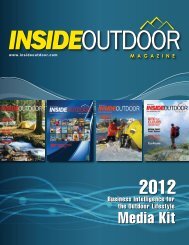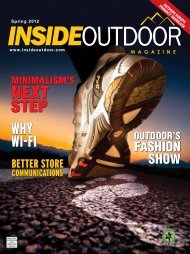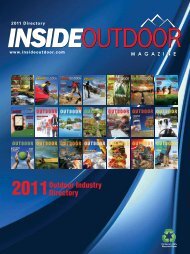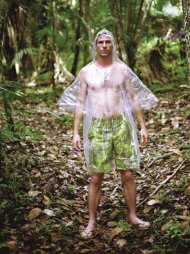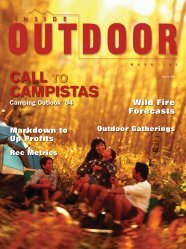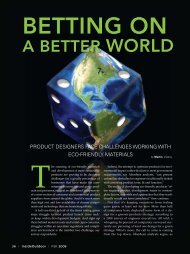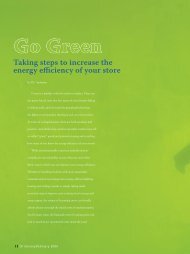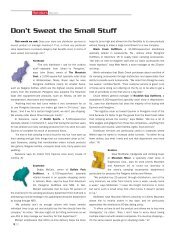Spring - InsideOutdoor Magazine
Spring - InsideOutdoor Magazine
Spring - InsideOutdoor Magazine
You also want an ePaper? Increase the reach of your titles
YUMPU automatically turns print PDFs into web optimized ePapers that Google loves.
For standards related to organic food,<br />
please see: http://www.ams.usda.gov/nop/<br />
indexIE.htm.<br />
Oxo-biodegradation<br />
A two-step process that begins with<br />
degradation by oxidation, followed by biodegradation.<br />
A variation of this developed for polymers,<br />
such as polyethylene, add a degradability<br />
component during the material’s manufacturing.<br />
The added component allows<br />
the polymer to thermo- (heat), photo- (light),<br />
or hydro- (water) degrade within 90 days in a<br />
commercial composting environment.<br />
It is purported that in non-commercial<br />
composting environments, the biodegradation<br />
will take place but at a much<br />
slower rate.<br />
RoHS<br />
An acronym for Restriction of Hazardous<br />
Substances Directive (the lead-free<br />
directive).<br />
Although not a law, the European Union<br />
passed this directive in 2006, limiting the<br />
use of six materials in any part of electronic<br />
and electrical products. The six materials<br />
limited by RoHS are: lead, mercury, cadmium,<br />
hexavalent chromium (chromium VI or<br />
Cr6+), polybrominated biphenyls (PBB) and<br />
polybrominated diphenyl ether (PBDE).<br />
PBB and PBDE are flame retardants used in<br />
some plastics.<br />
Similar standards have been adopted<br />
in China, Japan, Korea and California. The<br />
U.S. federal government currently has no<br />
plans to adopt a similar directive.<br />
Recycling<br />
The U.S. Department of Energy defines<br />
recycling as “the process of converting<br />
materials that are no longer useful as designed<br />
or intended into a new product.”<br />
Renewable Energy<br />
The U.S. Department of Energy defines<br />
renewable energy as “energy derived from<br />
resources that are regenerative or for all<br />
practical purposes cannot be depleted.<br />
“Types of renewable energy resources<br />
include moving water (hydro, tidal and<br />
wave power), thermal gradients in ocean<br />
water, biomass, geothermal energy, solar<br />
energy and wind energy.<br />
“Municipal solid waste (MSW) is<br />
also considered to be a renewable energy<br />
resource.”<br />
Sustainable development<br />
Economic, social (political) and environmental<br />
development that is harmonized<br />
for the good of all interests.<br />
Many, including the United Nations,<br />
use the definition from the Brundtland<br />
Report Our Common Future that “sustainable<br />
development is development that<br />
meets the needs of the present without<br />
compromising the ability of future generations<br />
to meet their own needs.”<br />
Others contend that this is not an operational<br />
definition and that the concept<br />
is best defined as “a socio-ecological process<br />
characterized by ideal-seeking behavior<br />
on the part of its human component,”<br />
which is adapted from the work of Russell<br />
Ackoff and Fred Emery, among others.<br />
Nevertheless, there are some that consider<br />
the phrase a greenwash oxymoron. To many,<br />
the concept of growth and depleting nonrenewable<br />
resources are mutually exclusive.<br />
Zero Waste<br />
An approach to the cradle-to-cradle<br />
concept that includes reduction of product<br />
or process waste and consumption,<br />
plus advancing the notion of reuse, repair<br />
or return to the environment.<br />
<br />
<br />
<br />
<br />
<br />
<br />
<br />
<br />
<br />
<br />
<br />
IO is Back Online<br />
www.insideoutdoor.com<br />
Explore Our Web<br />
Advertising Opportunities<br />
480.503.0770<br />
<strong>Spring</strong> 2008 | <strong>InsideOutdoor</strong> | 49




